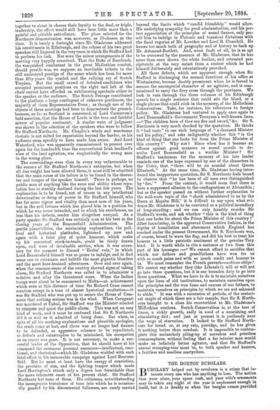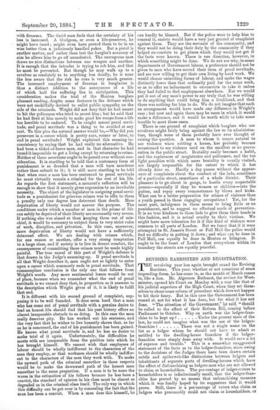THE HOXTON BURGLARS. B URGLARY helped out by revolvers is a
crime that in- terests every one who has anything to lose. The notion that your plate, your spare cash, and your wife's ornaments may be taken any night of the year is unpleasant enough in itself, but it is doubly so when the burglar comes provided with firearms. The timid man feels that the certainty of his loss is increased. A bludgeon, or even a life-preserver, he • might have faced ; might even have proved them to be in no wise better than a judiciously handled poker. But a pistol is another matter, and rather than test the burglar's accuracy of aim he allows him to go off unmolested. The courageous man draws no nice distinctions between one weapon and another. It is enough that the intruder is trying to rob him, and that he must be prevented. But though he may walk up to a revolver as resolutely as to anything less deadly, he is none the less aware that the risk he runs is very much greater. The increased employment of firearms in burglaries is thus a distinct addition to the annoyances of a life of which half the suffering lies in anticipation. This consideration makes the trial of the Hoxton burglars pleasant reading, despite some features in the defence which were not unskilfully devised to enlist public sympathy on the side of the criminals. Wright did not deny that he had meant to hit the policeman who tried to arrest him ; but he said that he had fired at him merely to make good his escape from a life too horrible to be endured. To be caught meant penal servi- tude, and penal servitude was a thing to be avoided at any cost. To this plea the natural answer would be,—Why did you persevere in a career which is pretty sure, sooner or later, to end in penal servitude ? Wright explained this seeming in- consistency by saying that he had really no alternative. He had been a ticket-of-leave man, and in that character he had found it impossible to get a living except by returning to crime. Neither of these assertions ought to be passed over without con- sideration. It is startling to be told that a customary form of punishment is so dreaded that a man will turn murderer rather than submit to it ; it is still more startling to be told that when once a man has been sentenced to penal servitude he must virtually remain a criminal for the rest of his life. As regards the first statement, a moment's reflection will be enough to show that it merely gives expression to an inevitable necessity. The object of the legislator in assigning penal servi- tude as a punishment for grievous crimes was to affix to them a penalty only one degree less deterrent than death. Mere deprivation of liberty would not answer the purpose. The conditions under which a number of men in the prime of life can safely be deprived of their liberty are necessarily very severe. If nothing else was aimed at than keeping them out of mis- chief, it would be necessary to subject them to very strict rules of work, discipline, and privation. In this case, moreover, mere deprivation of liberty would not have a sufficiently deterrent effect. We are dealing with crimes which, for one reason or another, offer a very strong temptation to a large class, and if society is to live in decent comfort, the consequences of committing these crimes must be made highly painful. The true moral of this part of Wright's defence is that drawn in the Judge's summing-up. If penal servitude is all that Wright describes it, men ought not so lightly to enter upon a career which commonly ends in penal servitude. That commonplace conclusion is the only one that follows from Wright's words. Any more sentimental lesson would be out of place, because when we remember what the end of penal servitude is we cannot deny that, in proportion as it answers to the description which Wright gives of it, it is likely to fulfil that end.
It is different with his second ground of complaint, sup- posing it to be well founded. It does seem hard that a man whO has come out of penal servitude with a genuine desire to lead an honest life should find that his past history offers an almost insuperable obstacle to so doing. In this case the man really deserves pity. He has worked out his sentence, and the very fact that he wishes to live honestly shows that, so far as he is concerned, the end of his punishment has been gained. He knows what penal servitude is, and he has no desire to make trial of it again. Unfortunately, the difficulties he meets with are inseparable from the position into which he has brought himself. We cannot wish that employers of labour should be wholly indifferent to the characters of the men they employ, or that workmen should be wholly indiffer- ent to the characters of the men they work with. To make the upward path of the criminal smoother in these respects would be to make the downward path of the honest man smoother in the same proportion. If a man is to be none the worse in the estimation of his fellows because he has been a convict, the standard of opinion in his class must be almost as degraded as in the criminal class itself. The only way in which this difficulty can be got over is by concealing the fact that the man has been a convict. When a man does this himself, he can hardly be blamed. But if the police were to help him to conceal it, society would have a very just ground of complaint against them. They are the servants of the community, and they would not be doing their duty by the community if they helped ex-convicts to get places which they would not get if the facts were known. There is one direction, however, in which something might be done. We do not see why, in some departments of Government labour, a preference should not be given to men who have served their term of penal servitude, and are now willing to get their own living by hard work. We would choose uninviting forms of labour, and make the wages distinctly lower than that ordinarily paid for the same work, so as to offer no inducement to ex-convicts to take it unless they had failed to find employment elsewhere. But we would put it out of any man's power to say truly that he was willing to do anything that could bring him a livelihood, and that there was nothing for him to do. We do not imagine that such an arrangement would have made any difference in Wright's case ; but now and again there may be cases in which it would make a difference, and it would be worth while to take some trouble to meet these cases.
There is one ground of complaint which burglars who use revolvers might fairly bring against the law or its administra- tors, though none of them probably have ever thought of raising the question. A man to whom it comes natural to use violence when robbing a house, has probably become accustomed to see violence used on the smallest or no provo- cation in the public street. Brutality easily becomes a habit, and the supineness of magistrates and policemen, and the too light penalties with which mere brutality is usually visited, are largely responsible for the extent to which it has already done so. Hardly a day passes without the appear- ance of complaints about the conduct of the lads, sometimes of a particular street, sometimes of a whole district. Their pleasure is to go about in gangs, to hustle every respectable person—especially if they be women or children—into the gutter, and repay every remonstrance by blows and kicks. What can be a better preparation for crimes of violence than a youth passed in these engaging occupations ? Yet, for the most part, indulgence in them seems to bring little or no punishment, and to suggest no effectual mode of prevention. It is no true kindness to these lads to give them their heads in this fashion, and it is actual cruelty to their victims. We might have more toleration for it if this kind of violence were common to all parts of London. But we fancy that if it were attempted in St. James's Street or Pall Mall the police would find no difficulty in putting it down ; and what can be done in Pall Mall, can equally be done in Hoxton or Islington. It ought to be the boast of London that everywhere within its boundary the streets are equally peaceful.



































 Previous page
Previous page